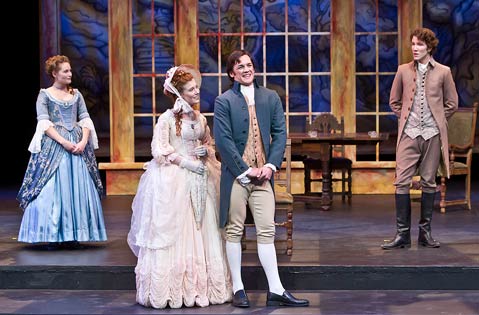She Stoops to Conquer at UCSB’s Hatlen Theatre
Oliver Goldsmith’s Classic Comedy in Saturday Night Performance

This excellent production of Oliver Goldsmith’s classic comedy conveys the complex process of mutual understanding in a straightforward and sympathetic fashion that will leave audiences delighted. As Marlow, Merlin Huff forges a realistic and poignant identity for his character that cuts through the layers of ambiguity introduced by his dilemma. In the female lead as Kate Hardcastle, Tarah Pollock carries herself with all the poise, sensitivity, and sophistication necessary to make this potentially off-putting role not only sympathetic, but understandable. With its gorgeous set, sumptuous 18th-century costumes, and subtle warmth, She Stoops to Conquer is a winning love story for the thoughtful and the jaded.
Dylan Hale plays the prankster Tony Lumpkin with appropriate gusto, and, as his cousin Constance Neville, Jennifer Michaels is both appealing and natural. Nico Kiefer plays Hastings, Constance’s suitor, and he and Huff do thorough justice to the roles and succeed in translating the demeanor of young 18th-century English gentlemen into 21st-century theatrical terms. But none of this would mean a thing if it weren’t for a trio of equally effective turns by actors playing the older generation of characters—Kelsey Foltz as Mrs. Hardcastle, a very funny Robert Torres as Mr. Hardcastle, and an entirely convincing Brian Bock as Marlow’s father, Sir Charles.
The two plots are variations on the familiar theme of young loves tested and proven, with the main drama given over to the masquerading Kate and her turn as a housemaid. Goldsmith has risen above what at the time was considered an acceptable way of depicting the course of affection and created something both harder and finer than one expects from the farcical premise. While there are many scenes in which simple dramatic irony works its magic—the one in which Tony laughs at Mrs. Hardcastle’s distress over some missing jewels comes to mind—the most telling moments arrive when least expected. As in Goldsmith’s equally splendid novel The Vicar of Wakefield, the snares of arrogance and presumption end up seeming weak when compared to the more powerful and lasting bonds of affection and humor.



